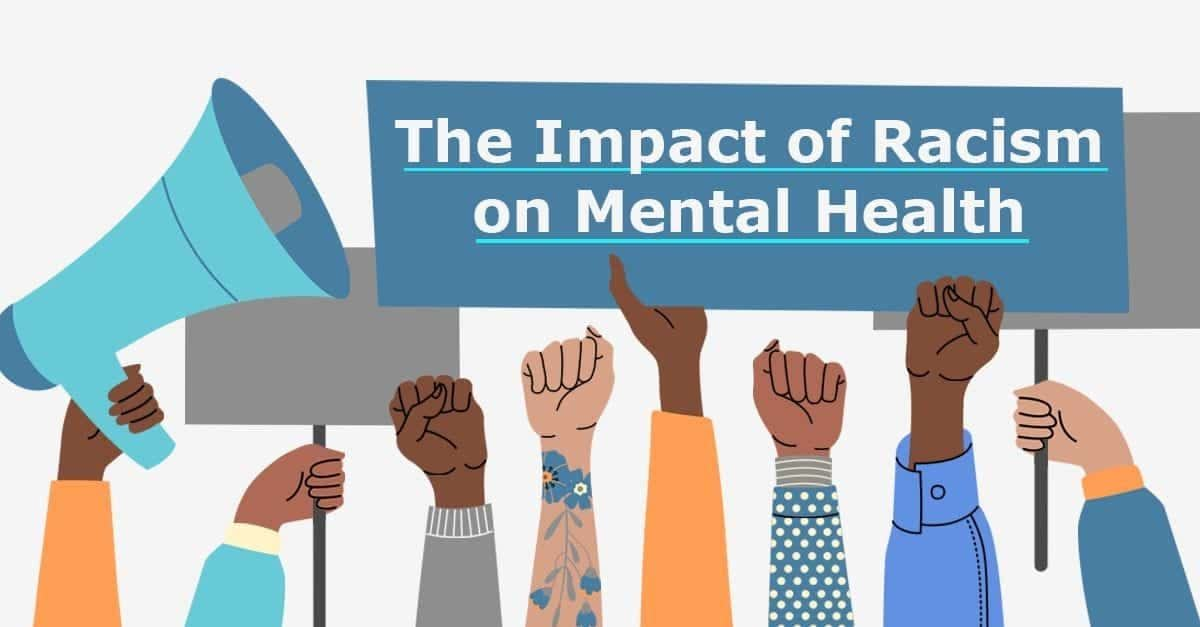May 14th, 2021

Racism has plagued America for centuries, making it impossible for BIPOC (Black, Indigenous, People of Color) to go about their lives unscathed. It can appear in many forms, and each takes a toll on mental health. The systemic racism in this country has caused disparities proven to affect all aspects of life – income, education, incarceration rates, healthcare access, and more.
In fact, CDC Director Dr. Rochelle Walensky recently released a statement declaring racism as a serious public health threat. She states, “…the pandemic illuminated inequities that have existed for generations and revealed for all of America a known, but often unaddressed, epidemic impacting public health: racism.”
Over the past year, we have all witnessed overt forms of racism in our news coverage. The pandemic fueled attacks against Asian people, a Black man named Ahmaud Arbery was shot while on a jog, George Floyd was murdered, and the list of tragedies goes on. Nationwide protests called for justice and reform, and the Black Lives Matter movement gained significant support. Great strides were made culturally and within some Government Institutions, but we still have a long way to go to reach true equality.
Racial trauma, also known as race-based traumatic stress (RBTS), refers to the emotional and mental impact caused by racism in any form. This can result from a person’s direct experiences with racism, vicarious experiences, and/or transmitted intergenerationally. This trauma does not necessarily occur after one significant incident and can arise due to an accumulation of experiences of racism.
Trigger Warning: The following examples of racism include discussions of abuse and violence.
Examples of Systemic Racism:
Examples of Vicarious Traumatic Stressors:
Examples of Intergenerationally Transmitted Stressors:
When trauma is experienced, our bodies release stress hormones. Repeated exposure to trauma causes negative mental and physical health effects as these stress hormones have a more frequent presence.
Brittney Owens, LCPC has witnessed firsthand the mental health impacts resulting from racial trauma. They include depression, grief, suicide ideation, loss of hope in our world and justice system, and worries of being the next victim of a violent hate crime.
Increased substance use, fear of engaging with others in certain settings, and nightmares are also symptoms that can be experienced. The ongoing stress resulting from experiencing racism can also cause physical health issues such as high blood pressure and heart disease.
Other than seeking help from a mental health professional, Brittney advises those struggling with mental health issues related to racial trauma to have conversations with those in their community. She recommends setting boundaries when doing so to ensure these conversations do not cause further distress.
Brittney also suggests getting in touch with your racial identity: “Oftentimes, a person can be so focused on the impacts of oppression that they only feel lost and hopeless. Identifying the strengths of your race can become a source of empowerment.”
Exploring activism opportunities can additionally serve as a healing experience and source of empowerment. Be mindful of how this work can affect you physically as well as emotionally and make time for self-care. This includes getting enough sleep, eating regularly, and doing activities you enjoy.
"Therapists need to be open to conversations about the current state of racism in our country, not only with non-white clients.
Instead of avoiding the topic, ask how the past year has affected them not only because of the pandemic but due to the social injustices that have occurred.
Starting this conversation will make clients more comfortable speaking about it."
-Brittney Owens, LCPC
Mental health treatment is most effective when an individual feels understood and heard by their provider. This connection is more difficult for BIPOC to obtain considering the majority of mental health providers are white and are not always culturally competent. In order to provide clients with the best level of care, it is vital for providers to be well educated on diverse populations.
When cultural competence is absent, a major impact this can have on BIPOC is misdiagnosis. This can be due to language barriers, differences in cultural presentation of symptoms, and/or stigma of mental illness among BIPOC. For example, Black men are four times more likely to be diagnosed with schizophrenia than white males presenting with the same symptoms.
Today can be the day you begin to further educate yourself to better serve people who do not look like you, who do not come from the same background as you, and who have experiences you will never be able to relate to.
At Clarity Clinic, we have highly trained staff who specialize in psychotherapy services related to symptoms experienced with racial trauma. To learn more about how we can support your mental health, call Clarity Clinic at (312) 815-9660 or schedule an appointment today.

Our Services
Virtual/Online CarePHP and IOPAdult PsychiatryChild & Adolescent PsychiatryAdult TherapyChild & Adolescent TherapyCouples CounselingFamily TherapyGroup TherapyPsychological TestingTranscranial Magnetic Stimulation (TMS)Resources
Refer a PatientCareersClinical Training OpportunitiesOur ProvidersFree Mental Health TestsCommonly Prescribed MedicationsLocationsBlogIn The NewsClarity Through CharityClarity for AllQuick Links
Patient PortalFAQsAccepted InsurancesContact us